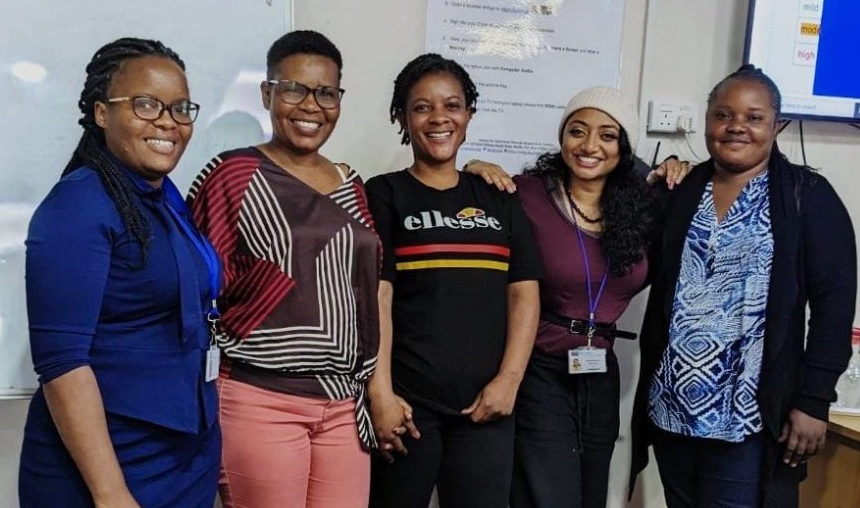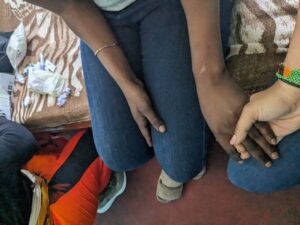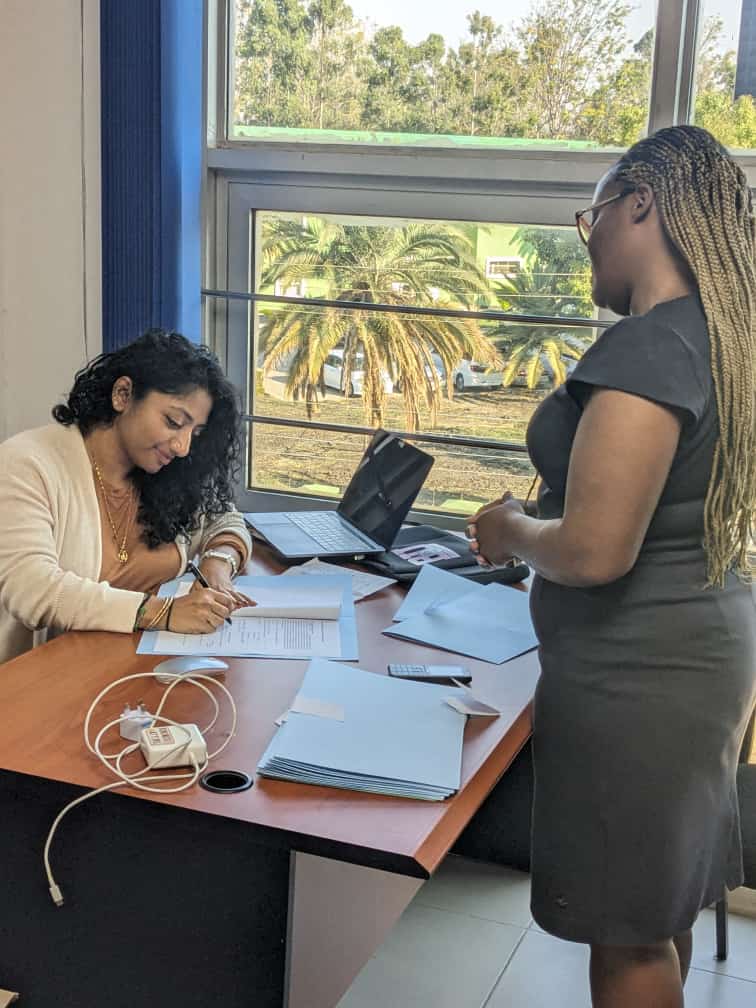Ramya Kumar‘s face lights up when she talks about her work in Zambia, and her chosen family in the Lusaka community. For nearly a decade, she has lived and worked as an epidemiologist in Zambia, investigating and responding to urgent outbreaks of disease.
“I loved Zambia so much that I never left after arriving in 2014 as a CDC ASPPH Fellow.”
Ramya has contributed to large multi-national randomized community trials, national surveys, and implementation science studies. She’s taught international workshops on epidemiologic methods and data analysis. She’s also mentored public health leaders through workforce development programs.

As Ramya began a PhD program through the University of Washington, she was inspired by Dr. Michael Herce, Director of Implementation Science at the Centre for Infectious Disease Research in Zambia (CIDRZ). His research focuses on decreasing barriers to HIV testing, prevention, treatment, and care for key populations by providing HIV services in the community, including at venues where key populations meet and socialize. Key populations (KPs) are people who inject drugs, men who have sex with men, transgender persons, sex workers and people who are incarcerated. KPs not only face a much higher risk of acquiring HIV, they are often unsuccessfully engaged by the health system for critical testing, care and treatment services compared to the general population.
“I thought this was a novel, grassroots approach to equitable healthcare for the people and by the people, leveraging KP social networks to deliver services through their own community. I really wanted an opportunity to learn from marginalized communities.”
“Even though I knew the University of Washington was not in the UNC Consortium for the Fogarty Fellowship, I really hoped that I could be considered.”
Dr. Ben Chi, who directs the UJMT Fogarty Fellowship Program through IGHID, encouraged her to apply to the program.
Ramya drafted her grant proposal “Stigma and Psychosocial Barriers to Pre-Exposure Prophylaxis (PrEP) Among Women in Sex Work in Lusaka, Zambia,” together with Dr. Herce, who is also an Assistant Professor of Medicine in Infectious Diseases and Associate Director of Operations with the Institute for Global Health and Infectious Diseases (IGHID), and Dr. Maurice Musheke, Deputy Director of Implementation Science at CIDRZ and a senior epidemiologist with over 10 years of experience leading KP programming in Zambia.
Today, Ramya is in the final stages of data collection for her dissertation study, working through CIDRZ, and as a UJMT Fellow.
The Last Mile of the HIV Pandemic
“We are in the last mile of the HIV pandemic, but to truly end it, we must reach underserved key populations with HIV prevention services in a way that reduces the stigma and barriers they face.”

Ramya describes the project as a unique intersection of social policy and health inequity, focusing on women who are systematically disadvantaged due to widespread discrimination and social exclusion.
“If we can understand the intersectional stigma and related psychosocial factors, we can take advantage of reachable moments with key populations and come up with new innovative ways to reduce HIV infections. Although our focus is HIV, we can take a holistic approach to health care and offer other important health services, since women in sex work are at a huge risk for substance use disorders and have unique mental health needs.”
Ramya is fascinated by stigma reduction as an emerging area of research and says her own marginalized identities drive her interests in equitable health services for marginalized populations.
“People think that we can’t do anything about stigma, but we absolutely can. There are many new interventions, strategies, and policies that we can use to reduce stigma and promote inclusive healthcare.”
The Study Aims
Ramya’s study looks at how different types of stigma affect whether HIV-negative adult women who engage in sex work, start and continue using PrEP, a medication that helps prevent HIV. The research team is also investigating the factors that support or hinder women in starting and staying on PrEP.
This includes going into safe spaces and other venues within the community, sometime these are brothels, sometimes they are women’s homes. Queen mothers, often older women in the sex work community, open up their homes and invite women in their social networks to come in to receive HIV testing services, and to learn more about the study from the study team. Ramya recalls holding the hand of one young woman, who was afraid, as she was being tested for HIV.
“She was someone who had been reached by the KP services, and initiated on PrEP, and shortly after she received a positive test result. It felt like we had failed to support her to stay on PrEP, so that she could remain HIV negative.”

Gaining Trust, Parallel Progress
Integral to the study is a Community Advisory Board, consisting of representatives from local Key Population Civil Society Organizations, Ministry of Health, and CIDRZ. The board provides guidance on how to speak to key informants and how to engage productively and safely with this highly stigmatized community.

“How do we minimize participant distress and maximize their safety and privacy? And what do we do if we find someone who is suicidal or is living with a substance abuse disorder? How do we link them to support services? These are all joint decisions we’ve made with the advisory board, and we remain accountable to them at all times.”
“We put this in place for the study because we all felt strongly that we should do this the right way, to build and nurture trust, to allow women with lived experience in sex work to speak more about the nature of the stigma and mechanisms that drive it. Then, this trust would move to a critical reflexive trust that allows us to talk openly, where we understand each other, and can be honest and direct, even if there’s a need to say, the way we are doing this study isn’t work and xyz needs to change.”
Ramya says that too often investigators from the Global North conduct research, extract knowledge from a community, and then the research is written up, published, and sent off to a conference. But in this study, the Community Advisory Board is helping shape the way the team will interpret the results and disseminate it within the KP community.
Cabotegravir and Ongoing Synergy
As the U.S. President’s Emergency Plan for AIDS Relief, or PEPFAR, makes plans to subsidize a transformational new biomedical HIV prevention medication, Cabotegravir, to a handful of countries, including Zambia, Ramya’s work and the board’s, will synergistically contribute. The long-acting injectable taken every two months has been shown to be more effective at HIV prevention than daily oral treatment.
“There will be a lot discussion around who should be prioritized for it, and this work was really important for us to understand whether it’s feasible for women in sex work.”
“Our study participants, are so excited to learn more about the research. They’ve never been approached to do research like this, related to their hidden lives, and it has made them feel like someone really cares about their health.”
The Africa CDC and African Union recently chose Ramya’s abstract on community based participatory research to present at the Conference of Public Health In Africa (CPHIA 2023), held in Lusaka next month. Her protocol manuscript has also been submitted to the BMJ.
Ramya also expresses appreciation to the UNC Institute for Global Health and Infectious Diseases, the UW Northern Pacific Global Health Research Fellows Training Consortium (Fogarty Consortium for UW), her sponsoring organization in Zambia, the Centre for Infectious Disease Research in Zambia (CIDRZ), and her doctoral committee, for helping her navigate the research requirements at two U.S. academic-research institutions.
